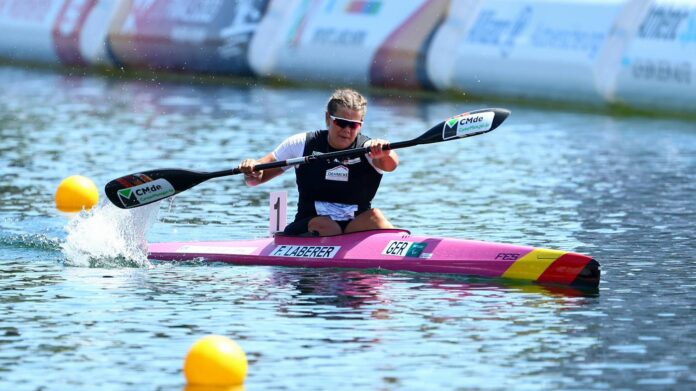The environment in which Felicia Laberer sits during the video call is loud and hectic. It contrasts perfectly with the para-canoeist, who seems calm and at peace with herself. On Sunday she will be competing in the Paralympics on the water in Vaires-sur-Marne. She is not excited yet, says the 23-year-old the day before, confirming her relaxed impression.
Laberer began her sporting career in para-swimming. She trained several times a day in Potsdam. When she lost interest in swimming, she switched to canoeing. In addition to practical reasons – the canoe training facility is not far from her former training site – her love of water also played a role in this decision.
“It’s just a different feeling than in other sports,” she says in a video call. Laberer has now been training in Berlin for several years.
She says she owes her sporting success, among other things, to her meticulous nature. “I like it when the coaches criticize me,” says the canoeist. “Because that is exactly what still needs to be improved,” she explains.
Without training, the dream of another medal, three years after winning bronze at the Paralympics in Tokyo, will not come true for Laberer either. In her daily training routine, she completes two training sessions before lunch. Up to two more follow in the afternoon. She rarely loses motivation. And when she does, she simply lets her training group pull her along – a factor that she particularly appreciates about group training.
Despite all the training, Felicia Laberer still gets bored occasionally. She likes to watch series – Gossip Girl or Pretty Little Liars, for example. Sometimes she also does something extra for her studies, she says with a wink.
Although their own competitions traditionally take place at the end of the Paralympics, the German canoeists and their team traveled to Paris one day before the opening ceremony – a first for the three starters, which was crowned by the election of Edina Müller, one of Laberer’s teammates, as the German flag bearer. However, the German canoe team did not have much time to explore Paris and attend other competitions. On Friday, Laberer attended her first and only competition outside of canoeing.
She is very grateful to have had enough time to test the conditions of the challenging course in Vaires-sur-Marne during training. A frequently changing wind creates very different conditions that you have to constantly adapt to. On Thursday, the canoeists were exposed to strong headwinds and high waves for the first time.
For Felicia Laberer, this Sunday will be her second final run on the Paralympic stage. In 2021, she made her debut in Tokyo – and immediately won bronze. She also attributes this success to her mental strength, which she still works on regularly with a sports psychologist. “In Tokyo, I was probably the worst in the starting field physically, but I had it so well under control mentally that I had another advantage and that’s why I may have won the medal,” she explains in an interview.
But her success in Tokyo also meant that the 23-year-old traveled to Paris with high expectations. “The pressure is there,” she says. It helps to accept it and concentrate on doing her best in the competition, to focus on things and to block out everything around her. Once she’s in the focus, she no longer notices the competitive atmosphere, which would otherwise be a disruptive factor for her sophisticated racing strategy.
Outside of the race, Laberer has also focused on exchanging pins with athletes from other nations in recent days. Felicia Laberer is also successful in this almost 23rd Paralympic sport.
She has already filled two lanyards and will probably fill up a third before the end of the Paralympics. It is a phenomenon that embodies the spirit of the games better than almost any other – community, exchange and competition.
